The Bagpipe Society
A wild bagpipe festival
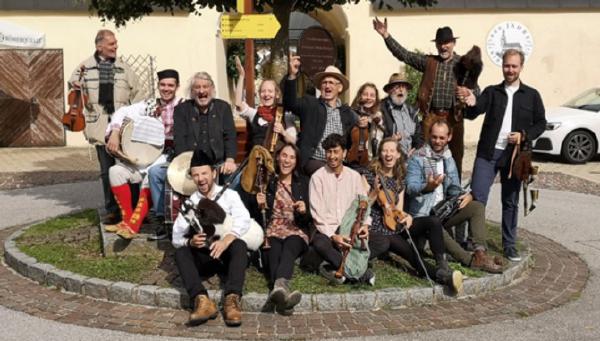
Have you heard the one about the Czech Mayor, the Austrian officer and the Macedonian PhD student who broke into an Alpine chalet?
This just about sums up the wildness of Sunnseitn Dudelsack Festival, where, after an evening of wild music the entire festival participants found themselves locked out of their accommodation. No problem at all! they said, and proceeded to use a well-placed picnic table and a few strong shoulders (think Macedonian lawyer and his friend the PhD student) to hoist an Austrian officer up to the first-floor balcony who prised open the bedroom window. The door key had been temporarily misplaced so the Czech Mayor helped everyone climb in through the ground floor window to continue the party indoors.
It is true that when you put a bunch of bagpipers and associated musicians together, anything can happen. Sunnseitn Bordun Dudelsack Festival is organised every two years by Sunnseitn, Unisonus and Utriculus. Pipers from around the world are invited to share music with the local community, and make
new friends. Sunnseitn Festival was particularly rocambolesque in August 2021, due to the restrictions imposed on music (no audiences allowed), which triggered incredibly innovative ideas by Gotthard Wagner, the main organiser.
The whole event started by playing at a local market in Kremsmünster, also known as the cradle of the Austrian bagpipe revival thanks to Rudi Lughofer’s activity. Rudi discovered the bagpipes in Czechoslovakia in the summer of 1968, a month before Soviet troops occupied Prague and effectively closed the borders. Smitten, and unable to forget the instrument he had seen hanging in a music shop, he smuggled himself back into the country a couple of months later. He managed to leave again with the bagpipes in his luggage, sparking a whole new movement in Austria, as he taught himself to play. After a break, he picked up piping again in 1983, collaborating with pipe maker František Havlíček and started his band in 1987.
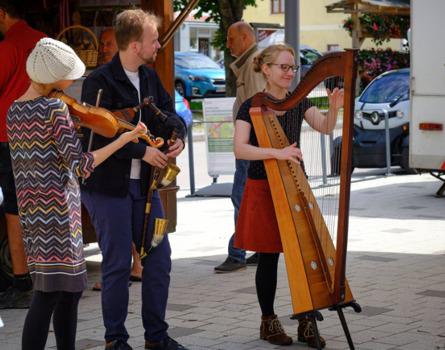
Through this, he revived the Bock, the Austrian bagpipe and became a reference to all Austrian pipers. Today, Rudi is passing on his knowledge to his grandson, Clemens, as well as to a few other youngsters in the village. It was a lovely moment to hear grandfather and grandson play at a café table in Kremsmünster as we milled around in the sunshine, drinking locally brewed beer.
After the market, where the mayor had taken the opportunity to do a little campaigning for the upcoming elections, we headed over to a ski resort, Postalm Winterpark to be precise. It being summer, or at least the end of August there was no snow. We had, however, caught a particularly chilly August and as we drove up the mountain, the thermostat lowered. By the time we reached the top, we were greeted with a temperature of 5 degrees centigrade. We were, however, rewarded with beautiful green pastures, gently rolling along the backdrop of the sharp Alps. Over the weekend, a couple of people couldn’t resist bursting into song here and there: ‘The hills are alive with the sound of muuuusic’. It truly felt like Heidi’s hideout, but instead of bumping into her or any other well-known story character, we were greeted by gentle brown cows with docile eyes placidly grazing the emerald grass.
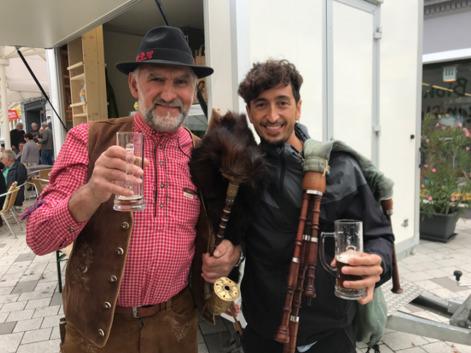
What followed at the ski resort was two days of unbridled fun and madness. Not allowed to play for an audience due to Covid regulations, we all played for our supper instead. This involved going to the various huts dotted around Postalm, and playing whilst being served traditional Austrian food and drink. The winterpark owner, Linus Pilar, greeted us in traditional clothes, and made sure that we were incredibly well looked after. The first evening was a huge success. About 25 of us crowded the tables and played all night long as the resort guests ate, chatted, danced, and applauded. Bagpipes of all shapes and sizes were taken out of bags, as well as fiddles, harps, saz, flutes, recorders, saxophones and drums. Musicians came from Macedonia, Czech Republic, Austria, Germany, Mallorca, France, and Poland.
Polish piper, Josef Kawulok, had a drone that was over 100 years old: this part of the bagpipe was passed down from generation to generation, like an heirloom.
Beautifully decorated with metalwork, the long drone was impressive, beautiful and graceful. Chanters, on the other hand, were renewed by each piper Aleksandar Arabajiev, from North Macedonia, came with a drummer from his group, and was accompanied by a very endearing black and white goat that danced and breathed as he played and sang. Cándid Trujillo Pons, from Mallorca, had brought both the xeremies and his flabiol and tamborí, a version of the pipe and tabor, much appreciated by the local crowd.
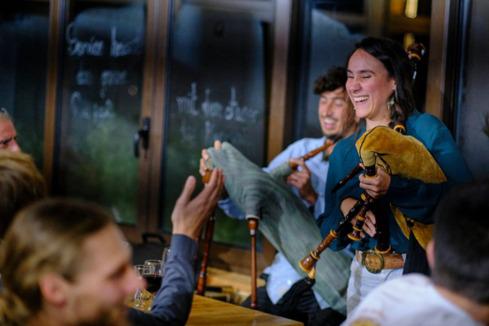
Together, we played a range of Mallorcan and Galician tunes, bringing the volume up substantially. Daniela Heiderich not only played roaring French tunes on the musette, she also brought a small harp, with which she sang heart wrenching Breton verses. Michael Vereno was up to his usual tricks, singing in harmony with his Austrian Bock, accompanied by the wonderful Lucy Wagner on the fiddle. Geza Frank impressed the crowd with virtuoso Irish tunes on the uilleann pipe, making full use of the regulators, a full orchestra to himself.
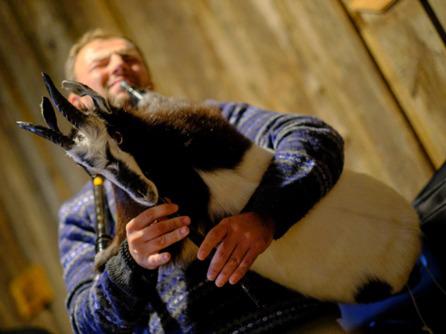
Photo Clébio Dossa.
Bagpipes were not the only stars of the event. Gotthard Wagner, Hermann Fritz and Andreas Luger blew the roof off the whole place with two fiddles and a drum. Imagine wild horses running at a gallop in a narrow valley, thundering across the landscape, shaking everything around them. This is what they sounded like, trumping any kind of piping going on that evening. I was floored by the energy emanating from them and thought I had heard it all, when they suddenly burst into yodelling, duetting together as their voices intermingled. What a night! What epic music! That evening, we all broke into the chalet, as some early birds had gone to sleep thoughtfully locking the place up behind them.
The next day brought new music and food. We processed through the fields to a small hut. By then, it had been established that the gaita and the xeremies were the most appropriate instruments for outdoor playing. So Cándid and I led the way, along with some drums, saxophones and musette. We ate some more meat and potatoes (all declined in many different forms, all as delicious as the next), before heading off to one of Gotthard’s crazy ideas. He had plotted with Postalm’s owner, to organise a flying concert. Two men had come up from the valley to operate the ski lift. We were to sit in them and play for the mountains. The wind was a little strong, so we waited until the rain abated and the wind calmed down. We all shouted a collective prayer to the sun:
‘MALLORCA! MALLORCA! MALLORCA!’
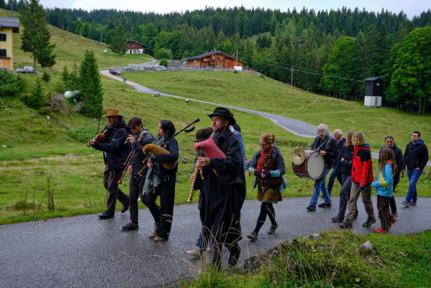
It worked: 15 minutes later, the sun started peaking out of the clouds. We rushed to the ski lifts and sat in them. Seconds later, we were in the air, playing for the pine trees, ragged summits and peaceful cows, as well as for a few families that had come to witness the madness. As we reached the top, other pipers came up behind us, and we would hear their music whizzing past us. Surely, there is no grander place to play than on a ski lift in the alps. It was stunning, to say the least.
As soon as we set foot on earth, the sun left us and we donned our rain caps again, and trudged to our accommodation, elated with the experience. Who needs an audience when the mountains are here to listen and the sky is your stage?
That evening, we ended the two days at Postalm with another incredible session in a third hut. I sampled a local delicacy: a deepfried sausage with melted cheese in the middle. Good thing we were piping to keep the calories in check.
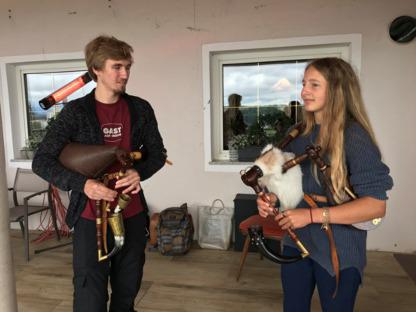
Photo Cassandre Balosso-Bardin
Half way through the evening, the sounds of accordion and trombone hit our ears: the landlord and his son had decided to get their instruments out, adding to the good cheer. As they played, the seated punters started clapping their hands in syncopation. We were witnessing the true music of the Alps, a moment rarely shared with outsiders we were told. To top it all, our Polish piper found, two tables across, his neighbour from back in Poland, randomly in the same Austrian hut as him. We really were at the right place at the right time. All good things come to an end. It had been two days, but by the next morning, we felt that we had all known each other for years. We parted after playing one last time in Kremsmünster in the presence of Rudi. Clemens rushed off to a wedding in Vienna, and Rudi played with one of his latest students, Zoé, who decided that this was the only instrument she wanted to learn after stumbling across it by accident. A familiar story for many of us, I imagine.
A festival with 25 musicians, litres of Austrian beer, the sky as a stage and the Alps as an audience. Sunnseitn Bordun Dudelsack Festival 2021 was a truly special event!
For more information and images: https://www.sunnseitn.org/single-post/vorankündigung
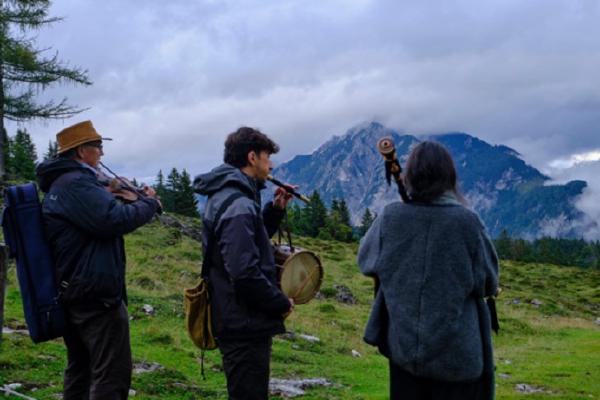
- Data Processing Notice (GDPR)
@BagpipeSociety on X (formally known as Twitter)
TheBagpipeSociety on Instagram
 BagpipeSociety on Facebook
BagpipeSociety on Facebook
Something wrong or missing from this page? Let us know!
